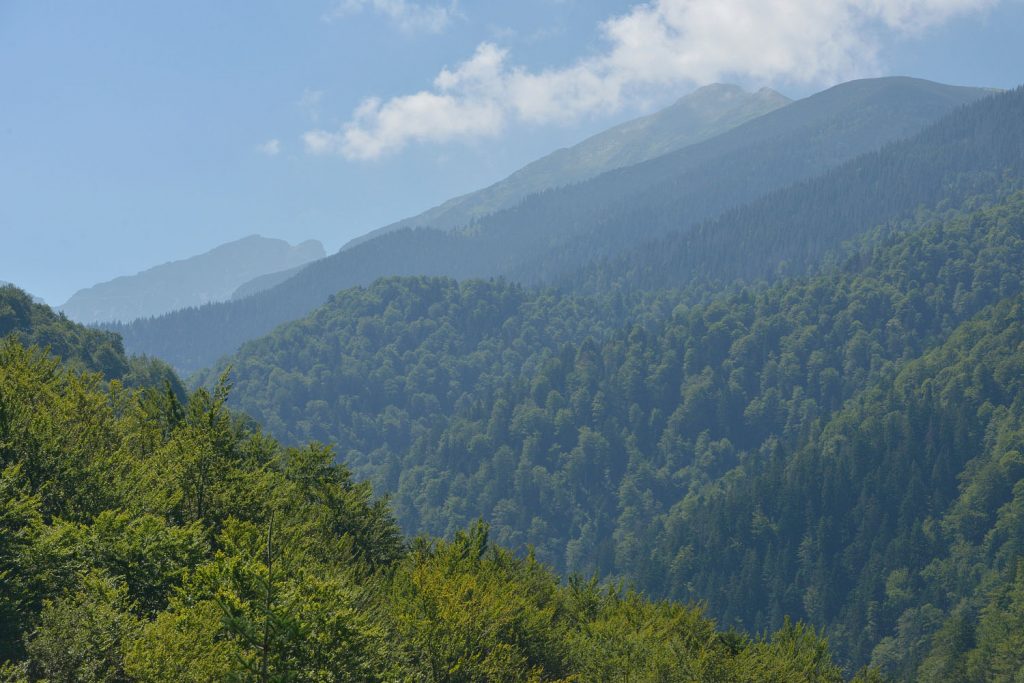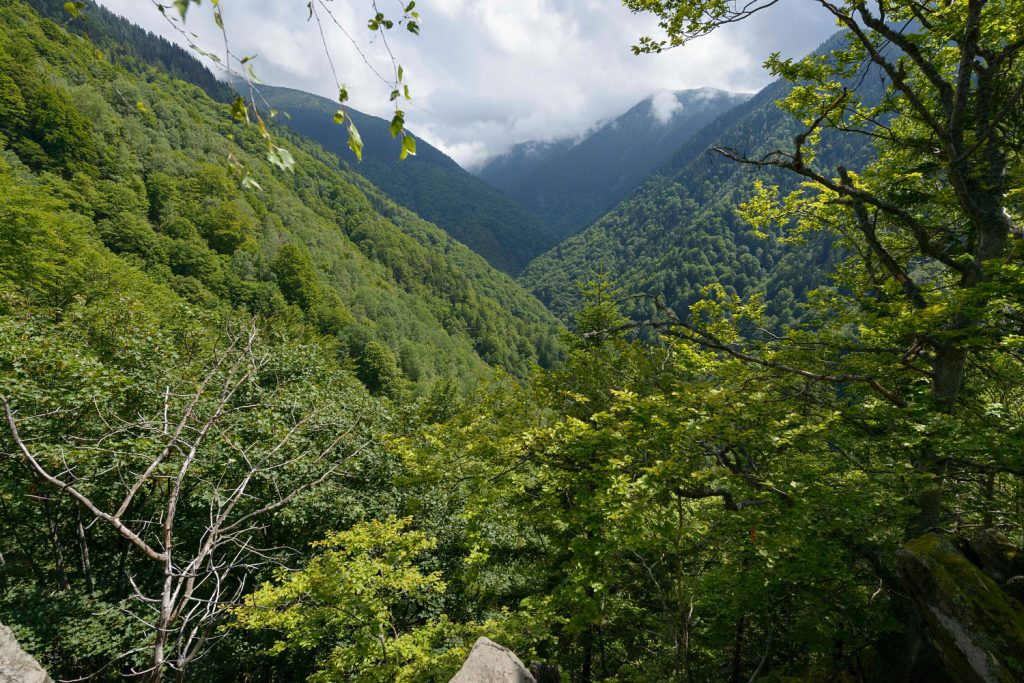German Environmental Foundation supports Romanian expert partners in mapping potential primeval forests and prepare studies for protection
Romania hosts the biggest share of central Europe’s primeval and ancient forests remains. Ten years ago there were estimated 200.000 – 300.000 ha. The Pin Matra inventory identified 218.000 hectars of old growth and “virgin” forest in 2005. More than in any other EU member state. However, this unique natural heritage is vanishing rapidly due to (often rather brutal) logging. More than half of these forests have been destroyed, in front of the eyes of EU and the Romanian authorities.
This is probably Europe’s biggest nature protection crisis today.
Responding to public pressure resulting from NGO campaigns (WWF) the Romanian Government agreed to set up a primeval forest protection programme, the “National Catalogue of Virgin / Cvasivirgin Forests”. Based upon expert studies forest stands can be submitted to authorities to be included into that “Catalogue”. But progress of population of that protection scheme is slower than the speed of logging. Development of expert studies is almost completely left to voluntary work by NGOs (WWF mapped large areas so far) and independent experts. In numerous cases the race between forest protection and logging interests was lost, large areas of Europe’s last untouched forests are progressively disappearing…
Professor Rainer Luick (Hochschule für Forstwirtschaft Rottenburg, Germany) managed to win support by the German Foundation Deutsche Bundesstiftung Umwelt (DBU) to fund Romanian experts developing expert studies for the “Virgin Forest Catalogue”.
The aim of the project is to assist and support Romanian efforts for the conservation of primeval and old growth forests. In particular Romanian DBU-project partners will visit potential primary forest areas, liaise with owner and forest managers, conduct scientific site checks regarding naturalness and compliance with criteria as set by the Ministerial order, compile their findings in studies, following the legal requirements, and submit to local Romanian forest authorities and the Ministry for Water and Forests. All studies will be written by Romanian ecology and forest experts. As soon as they are submitted they will be published on this website.
“Virgin forests” in Romania have theoretically been protected by law since 2008. In 2012, a government decision defined that all primeval forests, which had been registered by the Dutch-Romanian “Pin Matra” forest inventory in 2005 should be protected. However, in the last 10-15 years large areas of old growth and primeval forests have been logged, also in so called “Pin Matra” areas. The legal settings for forest protection have been, and still are, widely ignored. In 2016, the former Romanian government issued another Ministerial Orders (Nr. 1417/2016 and Nr. 2525/2016) which defined criteria for virgin forest identification and procedural settings for the development and submission of expert studies about “virgin and quasi-virgin forests” for the “National Catalogue of Virgin Forests”.

Several experts and organisations including WWF, Greenpeace, Agent Green so far submitted studies about virgin forests for the National Catalogue, but only a few of these expert papers have been accepted by authorities and a Ministerial commission so far.
Videos from drone flight over some of Europe’s last large primeval forests in Romania (produced by Ion Holban):
In order to provide information about the DBU-funded project and to make clear that the project aims to help with implementation of Romanian forest protection programs, Professor Rainer Luick sent a letter to the Minister for Water and Forests, Doina Pana on July 17th 2017, explaining the objectives of the project and asking for formal “acknowledgement and endorsement of the project by the Ministry”. A formal letter from the Ministry confirming their support for the DBU / German Government funded project would significantly help the expert project-partners – to identify themselves when getting in touch with forest authorities and owners and to build trust amongst stakeholders. Unfortunately the Ministry for Water and Forests is not willing to give that kind of support for the (Romanian) expert partners who are actually helping with the population of the Romanian “National Catalogue of Virgin Forests”… Unfortunately Minister Doina Pana answered in September 2017 that she wants to have a “neutral” approach and she does not want to take any step which might be interpreted as “favoring” one of the “parties”…
In October 2017 Prof. Luick also sent a letter to Romanian State Forestry Romsilva, offering co-operation regarding virgin forest identification and mapping. A response is pending…
Despite statements from Romanian government representatives in July 2017, that logging of primeval forests in Romania has been stopped and “virgin forests” are protected, rampant destruction continues. The experts found fresh logging in primeval, high ecological value forests during the trip. Those forests are theoretically under protection by Romanian law, but logging proceeds.
The situation has gotten worse since the new government was set up in 2017. No studies for the protection of “virgin forests” have been accepted by the Ministry this year. NGOs are alarmed by the latest government actions which could lead to an erosion of forest protection laws in Romania.
In June 2017, an irritating press release from the Ministry of Water and Forests stated that the ‘Pin Matra’ inventory study from 2005 does not exist, and neither the Ministry nor authorities have it. However, the study was published in 2005, the project was executed by the Royal Dutch Society for Nature Conservation (KNNV) in co-operation with Romanian Forest Research and Management Institute (ICAS). Other project partners were the IUCN-European Office and independent European forestry experts. Data from the study is used on the website www.inspectorulpadurii.ro which is run by the Romanian Government. NGOs reacted with great alarm at the time to the bizarre ministerial announcement and called it an attempt to derail forest protection in Romania.
Despite these setbacks, the DBU-Rottenburg project will do its utmost to help save some of Europe’s last large remnants of primeval forests. The expert teams started with field studies in July 2017. The project is funded for a period of two years.
Videos from drone flight over some of Europe’s last large primeval forests in Romania (produced by Ion Holban):
Valea Curpanului:
youtu.be/mdV6bbx64Mw
youtu.be/2PLGlpGXUrc
youtu.be/hv5JicvpWDA
Valea Laitei:
youtu.be/1T93U9pIim4
Baraolt Mountains:
youtu.be/kAG0MFRs4z8
youtu.be/YLVoZzqo6CQ
youtu.be/tYOKktTxkLI
youtu.be/_Bcuu4HZato

